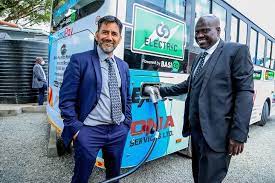After introducing Nairobi to its first public rapid charging station for electric buses, the Kenyan firm BasiGo, which operates electric buses, has become a household name in the city.
Following the introduction of a new e-mobility tariff and the subsequent approval of that pricing by the Energy and Petroleum Regulatory Authority (EPRA), whose mission it is to encourage environmentally responsible modes of transportation in Nairobi, the company located in Kenya was able to accomplish this goal.
BasiGo has officially unveiled the nation’s first fast charging station accessible to everyone in recognition of the fact that the availability of charging stations plays a vital role in the decision-making process that consumers go through when deciding whether or not to switch to electric vehicles.
As a result, with the opening of this most recent charging station, BasiGo now possesses a total of three charging stations that are able to recharge a combined total of twenty electric buses.
Read also: BasiGo launches Kenya’s first public EV charging station
The goal of BasiGo’s initiative
The Chief Executive Officer of BasiGo, Jit Bhattacharya, expressed gratitude to Kenya Power for the company’s assistance in determining the e-mobility rate. According to what he said, the charging stations will lead to an increase in the number of people driving electric vehicles in Kenya.
The goal of BasiGo’s initiative to establish Kenya’s first charging station is to make mobility in the country more environmentally friendly, to reduce the amount of air and noise pollution created by automobiles, and to improve the living conditions of the country’s inhabitants.
About BasiGo
BasiGo is an E-mobility start-up which aims to usher in a new era of innovation within the public transport industry by making available to the owners of public transport buses an electric alternative that is more affordable than diesel. Their team is deliberately made of seasoned entrepreneurs who have spent over a decade working and inventing within the fields of electric car technology, mobility in Africa, and renewable energy financing. Their headquarters are located in Nairobi, Kenya. They are a team that is committed to bringing about a mobility revolution in Africa that is both inclusive and sustainable.
More than one million buses traverse the continent of Africa every day, making them the most economical and easily available method of daily transportation. However, over one billion litres of diesel fuel is used annually in Africa’s public transport buses. Diesel emissions stifle the air quality in our cities, and diesel engines are one of the main sources of climate-altering CO2e emissions on the continent. This has a devastating impact on the continent’s ecosystem. As our cities continue to expand, we must require a paradigm shift towards environmentally friendly public transportation!
Jit Bhattacharya is one of the individuals that started BasiGo. A BasiGo bus, one of two that were used in the road pilot that began in the Kenyan capital in 2022. The business anticipates having one hundred of its electric buses operational by the time 2023 comes to a close. A “pay-as-you-drive” plan is being implemented by BasiGo, which means that the company will not be operating its own fleet of buses but rather will be selling buses directly to private operators in Nairobi.
The BasiGo K6 Electric bus, which has 25 seats, is currently available for preorder, and the company is accepting bookings for it. The K6 Electric Bus is now available for a purchase price of Ksh 5 Million in addition to an inexpensive subscription fee of Ksh 20 per kilometre when it is paired with the Pay-As-You-Drive battery subscription offered by BasiGo.




